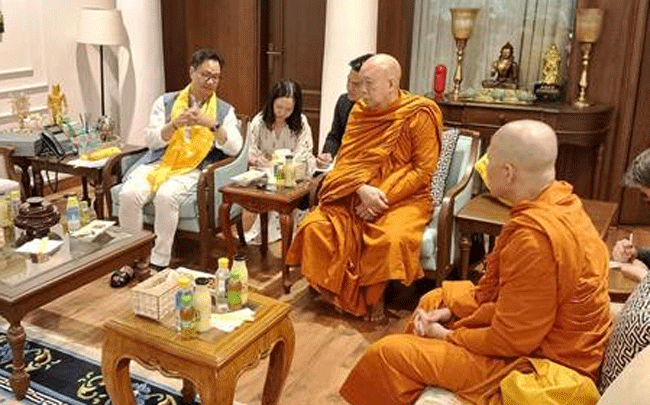New Delhi: The enduring spiritual and historical ties between India and Thailand, profoundly rooted in ancient connections and the shared heritage of Buddhism, continue to flourish through sustained high-level engagements. A recent series of significant exchanges underscores the vitality of this relationship, demonstrating a renewed commitment to cultural and religious diplomacy.
During his visit to Thailand, Prime Minister Narendra Modi notably emphasized this crucial linkage, particularly during his visit to the revered Wat Pho Temple, home to the iconic Reclining Buddha. As a symbolic gesture of the shared heritage, PM Modi presented a replica of the Ashokan Lion Capitol to the shrine. Further cementing these bonds, the Prime Minister also announced the forthcoming exposition of the Holy Relics of Devni Mori in Thailand. These precious relics, discovered in Aravali, Gujarat, in 1960, represent a tangible link to Buddhism’s origins in India and their journey across Asia.
In a significant follow-up to this visit, a high-level Thai Monk delegation recently arrived in India for a six-day visit, accorded the esteemed status of “Guest of the State.” The delegation, led by His Eminence Somdet Phra Therayanamuni, the acting Supreme Patriarch of Thailand, and including His Eminence Phra Kittisaramuni Kulphol, Deputy Abbot of Wat Debsirindravas, along with other distinguished members of the Thai Buddhist Sangha, exemplifies the deep respect and continued dialogue between the two nations’ spiritual leadership.
The delegation’s itinerary includes crucial meetings with Indian ministers, signifying the governmental recognition and support for these religious and cultural exchanges. Their travel to Gujarat is particularly noteworthy, serving as a pilgrimage to sites of immense Buddhist significance, including the origin point of the Devni Mori relics.
These reciprocal visits and gestures are more than mere diplomatic formalities; they are powerful affirmations of a shared civilizational heritage. The exchanges serve to:
- Reinforce Buddhist pilgrimage routes: By facilitating access to sacred sites in both countries, these visits encourage a deeper understanding and appreciation of Buddhist history and philosophy.
- Promote cultural understanding: The interactions between religious leaders and state representatives foster greater mutual respect and appreciation for the distinct yet intertwined cultural narratives of India and Thailand.
- Strengthen people-to-people connections: The spiritual dimension of these visits resonates deeply with the populations of both nations, fostering warmth and goodwill beyond formal diplomatic channels.
- Highlight India’s role as the land of Buddha’s enlightenment: The presentation of relics and visits to historical sites reaffirm India’s pivotal position in the genesis and spread of Buddhism.
The constant engagements at different levels, spearheaded by such high-profile visits, ensure that the deep-rooted historical relations between India and Thailand, founded on ancient connect and the enduring message of Buddhism, remain not just alive, but actively thriving for generations to come. This ongoing dialogue underscores the profound and lasting impact of shared spiritual values on international relations.


